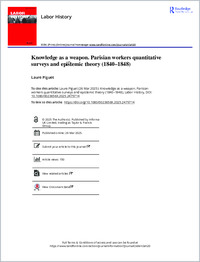Knowledge as a weapon. Parisian workers quantitative surveys and epistemic theory (1840–1848)
BHT
- Piguet, Laure University of Fribourg/Centre Marc Bloch, Humboldt University of Berlin
- 2025
Published in:
- Labor History. - Informa UK Limited. - 2025, p. 1-16
English
This article examines the characteristics of workers’ knowledge and the
role of knowledge in workers’ struggles for better living conditions in the
mid-nineteenth century. Based on quantitative surveys published
between 1840 and 1848 by two Parisian workers’ newspapers, La ruche
populaire and L’atelier, it shows not only that workers produced their
own surveys in order to make the deterioration of their situation visible,
but also that they used innovative methods. The article will first present
the workers tradition of producing quantitative knowledge, which dates
at least as far back as the end of the eighteenth century, and was the
background to the surveys of the 1840s. Second, it will be argued that
the workers’ surveys published in La ruche populaire and L’atelier were
used mainly, but not exclusively, to counter the hegemonic discourse
and the optimistic rhetoric of the ruling classes, who were claiming that
the economic situation of workers was improving. Finally, this article
uses the comments made by worker surveyors or members of the newspapers’
editorial boards on their knowledge practices and methodology
to prove the existence of a specific workers’ epistemology and philosophy
of the sciences. As will be shown, they formalized a ‘standpoint
theory,’ thus anticipating Karl Marx in the Economic and Philosophic
Manuscripts of 1844.
role of knowledge in workers’ struggles for better living conditions in the
mid-nineteenth century. Based on quantitative surveys published
between 1840 and 1848 by two Parisian workers’ newspapers, La ruche
populaire and L’atelier, it shows not only that workers produced their
own surveys in order to make the deterioration of their situation visible,
but also that they used innovative methods. The article will first present
the workers tradition of producing quantitative knowledge, which dates
at least as far back as the end of the eighteenth century, and was the
background to the surveys of the 1840s. Second, it will be argued that
the workers’ surveys published in La ruche populaire and L’atelier were
used mainly, but not exclusively, to counter the hegemonic discourse
and the optimistic rhetoric of the ruling classes, who were claiming that
the economic situation of workers was improving. Finally, this article
uses the comments made by worker surveyors or members of the newspapers’
editorial boards on their knowledge practices and methodology
to prove the existence of a specific workers’ epistemology and philosophy
of the sciences. As will be shown, they formalized a ‘standpoint
theory,’ thus anticipating Karl Marx in the Economic and Philosophic
Manuscripts of 1844.
- Faculty
- Faculté des lettres et des sciences humaines
- Department
- Département d'histoire contemporaine
- Language
-
- English
- License
- Open access status
- hybrid
- Identifiers
-
- DOI 10.1080/0023656X.2025.2479714
- ISSN 0023-656X
- Persistent URL
- https://folia.unifr.ch/unifr/documents/331521
Statistics
Document views: 30
File downloads:
- knowledgeasaweapon.parisianworkersquantitativesurveysandepistemictheory18401848-1: 87
